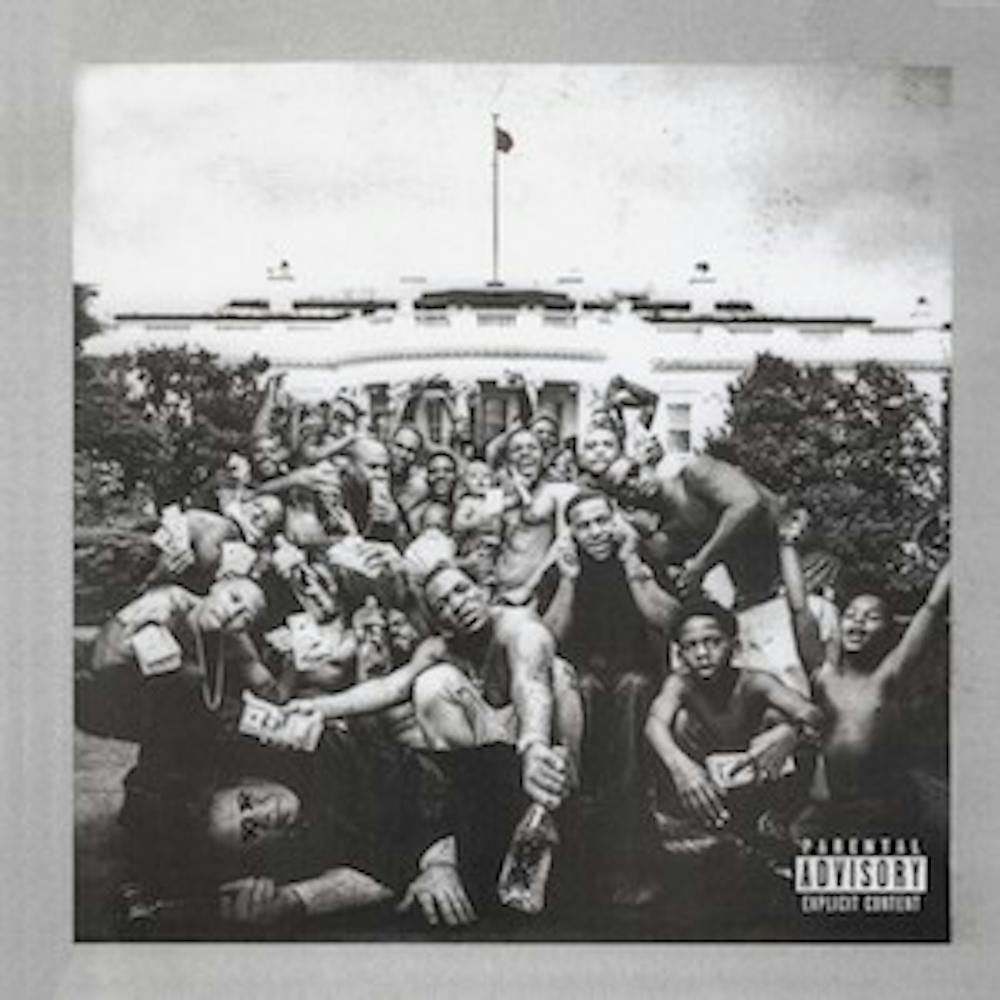In Kendrick Lamar’s “To Pimp a Butterfly,” the Compton MC provides his fans with a new take on an old sound and alternative content.
Lamar’s new album is both personal and universal, both a condemnation and a celebration. In fact, while it may seem a point of conflict, this dualism makes “TPAB” stand out both in concept and in content and makes it darker in style than his preceding LP “good kid, m.A.A.d city.” Even though the production takes a backseat with respect to Lamar’s varying flows and powerful lyrics, a supporting cast featuring Terrace Martin, Thundercat, Pharrell and company raises classic sounds to new heights, creating equally authentic and intimate atmosphere.
In the George Clinton-featuring “Wesley’s Theory,” the album’s opening track, Lamar opens up about his fears of letting his fame and acclaim consume him, eventually allowing for powerful institutions to bear down on him, much like what happened to actor Wesley Snipes. This idea is taken a step further in “For Free?,” the first interlude of the record in which an unidentified irate female character who embodies these institutions berates Lamar. His internal conflict with the record’s dualist nature is perhaps most apparent in “King Kunta,” in which Lamar contrasts the idea of being a king with being a “Kunta,” a reference to Alex Haley’s character Kunta Kinte. Metaphorically, the slave owners are the powerful and oppressive American institutions Lamar struggles against. In the line “I’m mad, but I ain’t stressin’,” Lamar expresses that he doesn’t like being in this position but he accepts it as his fate as someone who has the “yams,” representing money, power and prestige.
“Institutionalized” expresses Lamar’s reasoning for the external forces controlling his position, while also providing one of the best uses of Snoop Dogg in recent memory. Lamar’s struggle, which hinges on a love-hate relationship, continues as the artist self reflects in ”u,” before going back to his roots in “Momma” and “Hood Politics.”
The rapper offers a rallying cry for black pride in “Complexion” and “The Blacker the Berry” with the former featuring Rapsody, highlighting the importance of black women in the community. At this point in the album, Lamar’s confidence climbs, and eventually climaxes with a variant of the Grammy-Award winning single “i,” where Lamar finally realizes what he must do — take the torch for his community while turning his back on fame in order to do things his own way. The song concludes in “some a capella sh--” as Lamar empowers the term “Negus” — which denotes an emperor in pre-1974 Ethiopia — while undermining the racial slur derived from it.
“TPAB” culminates in the 12-minute “Mortal Man.” At this point, Lamar accepts the responsibility of the role he has decided to take up, but still seeks answers to the significant questions asked through the course of the album. He finds counsel in an unreleased Tupac interview, one that is masterfully tailored to emulate a conversation with the late rapper and, with an unnerving yet subdued jazz ensemble backdrop, Lamar is able to masterfully complete the metaphor that gives his album its name.
If Lamar’s second major-label project gets flack, it could be for its lack of immediate hits as seen on “good kid, m.A.A.d city” or the fact that Lamar didn’t quite release the fiery flow and lyricism that so many of his fans have grown used to — but that’s the beauty of “TPAB.” It puts focus on the album as a whole, the narrative, and the message that Lamar is trying to convey. Without constructing his project as is, Lamar would’ve been unable to take the listener on such a powerful journey of self-actualization. When “TPAB” is listened to out of order, it loses much of its effect, a fact that highlights all the detail that Lamar put into this ambitious album and the good quality of the recording as a whole.
Lamar succeeds in triumphing the sophomore slump as he carefully crafts an intricate and deep look into his conflicted mind over 16 tracks, which will, without a doubt, become a classic. It seems the sky's the limit for Lamar, judging by the album’s critical acclaim upon release. The biggest question is asked not by Lamar, but his fans — where will he take his art next?







